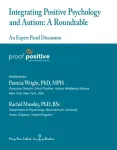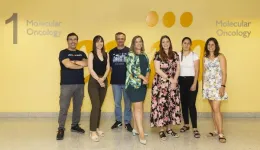(Press-News.org) The University of North Carolina at Chapel Hill is launching the Institute for Risk Management and Insurance Innovation, a new interdisciplinary research and innovation hub that will leverage the expertise of faculty and students from various disciplines across campus to address complex challenges in risk management and insurance.
“The institute will address the financial risks arising from a growing number of threats to our state and beyond, ranging from extreme weather to cybersecurity,” explains Vice Chancellor for Research Penny Gordon-Larsen. “UNC-Chapel Hill is a world leader in translating extreme environmental events into financial risk and now seeks to expand into a wider range of emerging perils.”
The institute will foster collaboration among researchers from multidisciplinary fields who share an interest in developing innovative solutions for managing financial risks. The institute will also offer educational programs and experiential learning opportunities for undergraduate and graduate students interested in pursuing careers in the risk management and insurance industry.
UNC-Chapel Hill Board of Trustees Chair John Preyer cited the institute as an example of "a program that both expands knowledge and prepares our students to be strong contributors to the 21st century workforce."
The Institute for Risk Management and Insurance Innovation will be led by Greg Characklis, W.R. Kenan Jr. Distinguished Professor in the Department of Environmental Sciences and Engineering within the Gillings School of Global Public Health.
“The new institute will conduct research that improves our understanding of society’s emerging financial risks and our ability to better manage these risks, even as we prepare a new breed of student to become leaders in the risk management and insurance industry,” said Characklis.
For more information, please see Vice Chancellor for Research Penny Gordon-Larsen’s message to the UNC-Chapel Hill research community.
The University of North Carolina at Chapel Hill is launching the Institute for Risk Management and Insurance Innovation, a new interdisciplinary research and innovation hub that will leverage the expertise of faculty and students from various disciplines across campus to address complex challenges in risk management and insurance.
“The institute will address the financial risks arising from a growing number of threats to our state and beyond, ranging from extreme weather to cybersecurity,” explains Vice Chancellor for Research Penny Gordon-Larsen. “UNC-Chapel Hill is a world leader in translating extreme environmental events into financial risk and now seeks to expand into a wider range of emerging perils.”
The institute will foster collaboration among researchers from multidisciplinary fields who share an interest in developing innovative solutions for managing financial risks. The institute will also offer educational programs and experiential learning opportunities for undergraduate and graduate students interested in pursuing careers in the risk management and insurance industry.
UNC-Chapel Hill Board of Trustees Chair John Preyer cited the institute as an example of "a program that both expands knowledge and prepares our students to be strong contributors to the 21st century workforce."
The Institute for Risk Management and Insurance Innovation will be led by Greg Characklis, W.R. Kenan Jr. Distinguished Professor in the Department of Environmental Sciences and Engineering within the Gillings School of Global Public Health.
“The new institute will conduct research that improves our understanding of society’s emerging financial risks and our ability to better manage these risks, even as we prepare a new breed of student to become leaders in the risk management and insurance industry,” said Characklis.
For more information, please see Vice Chancellor for Research Penny Gordon-Larsen’s message to the UNC-Chapel Hill research community.
END
UNC-Chapel Hill launches the Institute for Risk Management and Insurance Innovation
2024-08-14
ELSE PRESS RELEASES FROM THIS DATE:
Integrating positive psychology and autism: A roundtable
2024-08-14
A new Roundtable Discussion in the peer-reviewed journal Autism in Adulthood explores how the two fields of positive psychology and autism might integrate and benefit each other, and the autism community at large. Click here to read the Roundtable.
The Roundtable was co-moderated by Patricia Wright, PhD, MPH who is the Executive Director of Proof Positive: Autism Wellbeing Alliance, an organization committed to integrating autism services and the field of positive psychology and Rachel Moseley, ...
UC Irvine scientists create material that can take the temperature of nanoscale objects
2024-08-14
Irvine, Calif., Aug. 14, 2024 — University of California, Irvine scientists recently discovered a one-dimensional nanoscale material whose color changes as temperature changes. The team’s results appeared in Advanced Materials.
“We found that we can make really small and sensitive thermometers,” said Maxx Arguilla, UC Irvine professor of chemistry whose research group led the study. “It’s one of the most applied and translatable works to come out of our lab.”
Arguilla ...
Dark rituals: Understanding society's fascination with death and disaster
2024-08-14
Understanding why the popularity of organised events steeped in themes of death, disaster and suffering, such as the well-known Dia de los Muertos (Day of the Dead), Jack the Ripper Walking Tours and Remembrance Sunday, could be key to a deeper understanding of society, say researchers from the University of Surrey.
In a study published by Annals of Tourism Research, researchers introduce a comprehensive framework to analyse these events, drawing from fields as diverse as thanatology (the scientific study of death and the practices associated with it), dark tourism, and collective memory ...
Combining computational methods and experimental techniques to unlock floating offshore wind potential
2024-08-14
A collaboration between researchers from Johns Hopkins Whiting School of Engineering (WSE) and Portland State University (PSU) aims to help unlock the vast potential of floating offshore windfarms in the United States by improving understanding of wind-wave-turbine interactions, which if not accounted for properly, can greatly reduce the power output of a group of wind turbines.
The project combines developing a new computational method for enhancing the accuracy of Large Eddy Simulations (LES) – a mathematical computer model that depicts the wind field within floating offshore windfarms, with advanced experimental ...
Twelve Ochsner Health hospitals recognized for efforts to improve outcomes for Americans with heart disease and stroke
2024-08-14
NEW ORLEANS, La. – Twelve Ochsner Health owned and affiliated hospitals are among the more than 3,000 nationwide that participate in the American Heart Association’s Get With The Guidelines® (GWTG) and other programs to improve outcomes for Americans who experience heart disease or stroke.
Heart disease and stroke are the No. 1 and No. 5 causes of death in the United States, respectively. These health crises require swift and proven treatment to ensure the best outcomes for patients. The American Heart Association, celebrating 100 years of work to advance health and hope for everyone, everywhere, ...
Hydrometeorology and location affect hospitalizations for waterborne infectious diseases in the US
2024-08-14
An analysis of 12 years of data collected from over 500 hospitals in 25 different states shows that weather, geographic location, and urban or rural location all appear to influence hospitalizations for waterborne infectious diseases, according to a study published August 7, 2024 in the open-access journal PLOS Water by Victoria Lynch and Jeffrey Shaman from Columbia University.
Waterborne infectious diseases caused by bacteria, parasites, and viruses still affect over 7,000,000 people annually in the United States. Lynch and Shaman analyzed potential links between weather and hospitalizations for waterborne ...
Alzheimer’s cognitive decline predicted by patient’s age, sex, and irregular heart rhythm
2024-08-14
Older age, female sex, irregular heart rhythms, and daily activity levels can help to predict how much Alzheimer’s Disease patients’ cognitive function will decline, and how much they will depend on their caregivers over the next two years. The results suggest new ways to predict cognitive decline in patients, and that caregivers need to be considered in treatment plans. 'Liane Kaufmann from the Ernst von Bergmann Clinic in Potsdam, Germany, Josef Marksteiner from the General Hospital in Hall, Austria, and colleagues present these findings in the open access journal PLOS ...
Gender-sensitive job titles may affect women’s interest in job ads
2024-08-14
A new study suggests that the use of gender-sensitive language in the title of job advertisements may influence the level of interest demonstrated by female potential applicants. Dominik Hetjens of Technische Universität Dresden, Germany, and Stefan Hartmann of Heinrich-Heine-Universität Düsseldorf, Germany, present these findings in the open-access journal PLOS ONE on August 14, 2024.
German is one of many languages in which every noun is grammatically masculine, feminine, or neutral. For instance, ...
CNIO researchers discover a 'switch' for the desire to engage in physical activity: Two proteins that get activated in the muscle during exercise
2024-08-14
"We have discovered a muscle-brain pathway that controls the eagerness to train more when we exercise," explains Guadalupe Sabio, a researcher at the Spanish National Cancer Research Center (CNIO).
One of the proteins identified activates the area of the brain that controls movement. Obese patients have lower blood levels of this protein.
This result suggest it may be possible to develop drugs for people specially in need of the benefits that come from exercise, but are reluctant to do it.
The ...
A taste for carbon dioxide
2024-08-14
Nitrogenases are among the most geochemically important enzymes on Earth, providing all forms of life with bioavailable nitrogen in the form of ammonia (NH3). Some nitrogenases can also directly convert CO2 into hydrocarbon chains, making them an exciting target for the development of biotechnological processes. A team of researchers in Marburg, Germany, led by Max Planck scientist Johannes Rebelein, has now provided a comprehensive insight into the substrate specificity and preferences of nitrogenase. Their results challenge the current understanding of nitrogenases and highlight their potential for sustainable bioproduction.
Nitrogen is one of the main building blocks ...





